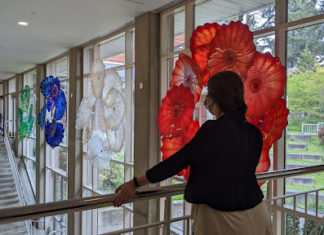By Samantha Lund, Columnist
After Thanksgiving and Christmas are over, when the trees and lights are put away, it is easy to get lost in the post-holiday blues. Especially since we have to come back to campus and begin the long, cold month of J-term.
January is hard. It is cold, classes seem to last forever, you see the same people every day and on top of it all you have to look at the Facebook pages of your friends who are studying away in Argentina or New Zealand having a great time. Not to mention Old Main Market will no longer be playing holiday music and serving delicious holiday treats — hard life, I know.
Even though we can label it with a cute nickname like the ‘Winter Blues,’ Seasonal Affective Disorder (S.A.D.) is very real and affects the majority of people in Washington during the cold and dark months of winter. The majority of doctors agree that lack of sunlight is the leading cause of S.A.D.
Not only do we live in Washington, where there is rarely a sunny day past September, but as winter creeps in, the sunny days become shorter. The lack of sunlight throws off a person’s circadian rhythm which is the mental clock telling your body when it is time to sleep or be awake.
“It’s too cold and gloomy to go outside,” sophomore Emily Knutsen said. “So people stay inside and get depressed.”
According to WebMD, light therapy is used to combat S.A.D. However, there is no cheap, student-friendly form of light therapy unless you plan on sitting in a tanning bed for hours every month — probably not the best plan. There are plenty of wallet- and skin-friendly ways students use to get around their winter blues.
“It really hurts me,” first-year Sam Stadter said. “How do I get over it? I go to tennis practice and do extra curricular activities.”
If you find yourself in a long battle with the winter blues and aren’t quite at the point where you want to give in and call your doctor, try making yourself feel a little better at home. Try rearranging your room so you are always close to a window — except while changing of course.
The exposure to the sunlight from outside can make the long days spent in your room or a classroom more bearable. The outside cues can also help your body understand what time of day it is and what it needs at that time.
“Just get outside,” junior Ashley Marcy said. “Go embrace it — the cold, the outside.”
Having good health is twice as important in winter. In the summer, the sun adds vitamins and the heat helps your body stay healthy. In the winter, it’s a different situation.
When the sun goes down and the days get colder, having a well-balanced diet and a regular workout schedule can keep you from getting sick or depressed.
All the suggestions I’ve put on the table so far are good, since you should know what is scientifically proven to help. But sometimes it is up to you to take the time and make yourself feel good.
Grab a fuzzy blanket, some hot chocolate and a friend to watch a movie. You could also grab your friends and go see a hockey game if that is more your speed. If you want to make yourself really happy this winter, grab a cute girl or guy and have them warm your feet … if you catch my drift.
Take the winter blues and beat it this J-term. Just destroy it and do not even feel bad. Be happy, be healthy and get through to February. Valentine’s Day is a whole different story.





























